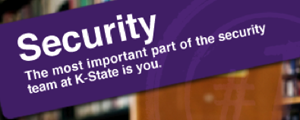K-State broke a record in 2010, but it is not a record to be proud of: 445 K-Staters were tricked into giving away their passwords to criminals in response to spear-phishing scam e-mails. The criminals then used the stolen information to sign in to webmail and send thousands of spam messages.
Obviously, the first thing on this semester’s top-six security list must be:
- Never give your password to anyone in an e-mail message! K-State was plagued by 406 instances of phishing scams in 2010 (compared to 296 in 2009) that try to trick people into replying with their eID password. The hackers responsible for these scams are relentless! If you remember this one simple rule, you can prevent becoming a victim: K-State IT support staff will never ask for your password in an e-mail, nor will any legitimate business or organization. If you get such an e-mail, just delete it. The same holds if you get an email with a link to a web form that asks you to fill in your username and password – don’t do it!
Continue reading “Six things you need to know about IT security at K-State”
